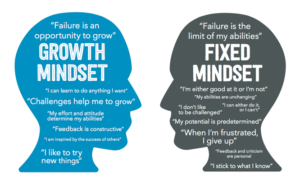3 ways parents can instill a growth mindset
The way parents talk about ability and learning can have powerful effects on their kids’ beliefs. Below are three ways parents can instill a growth mindset. And remember, developing a growth mindset in yourself and in your kids is a process that takes time. Have a growth mindset about developing a growth mindset!
#1. Recognize your own mindset:
Be mindful of your own thinking and of the messages you send with your words and actions.
When parents spend time thinking about their own mindset, most can recognize aspects of both growth mindset and fixed mindset in their own thinking. Sometimes we might have a fixed mindset about some abilities like math or art but a growth mindset about others. If we want our children to develop a growth mindset, we need to be mindful of our own thinking and of the messages we send with our words and with our actions. Here are some examples of fixed mindset statements and corresponding growth mindset statements. Think about what messages they send and what messages you want to send with your own words.
| Fixed |
Growth
|
| I’m dumb. |
What am I missing? |
| This is too hard! |
This will take a lot of effort! |
| She must be smart. |
I want to learn her strategies. |
| I’m naturally good at this. |
How can I keep improving? |
#2. Praise the process:
Praising kids for being smart suggests that innate talent is the reason for success, while focusing on the process helps them see how their effort leads to success.
Our intuition is often to praise kids when they’re smart, but this kind of praise sends the wrong message. If our kids are praised for being smart when they understand something quickly, then what will they think when they encounter something hard? Being praised for intelligence can make kids think, “If my past success made me smart, my current struggle makes me dumb.”
Instead of praising kids for being smart when they understand something quickly, praise them when they work hard to accomplish something difficult. This tells them that you value hard work, and that hard work is what leads to success.
#3. Model learning from failure:
When parents talk positively about making mistakes, kids start to think of mistakes as a natural part of the learning process.















